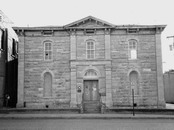COLLIN COUNTY PRISON
Kentucky Street, 1 blk. S. of the
Square, McKinney

Historical marker, 1990
COLLIN COUNTY PRISON
DESIGNED BY F. E. RUFFINI, ARCHITECT
OF NUMEROUS PUBLIC BUILDINGS IN
TEXAS IN THE LATE 19TH CENTURY,
THIS HIGH VICTORIAN ITALIANATE
STRUCTURE SERVED AS THE COLLIN
COUNTY PRISON FOR 99 YEARS. COM-
PLETED IN 1880, IT WAS MODIFIED
IN 1938 WITH FUNDS FROM THE
FEDERAL PUBLIC WORKS ADMINISTRA-
TION. PROMINENT FEATURES OF THE
BUILDING INCLUDE ITS BRACKETED
CORNICE AND ARCHED WINDOWS. IT IS
ONE OF THE FEW F. E. RUFFINI STRUC-
TURES REMAINING IN THE STATE.
RECORDED TEXAS HISTORIC LANDMARK
COLLIN COUNTY PRISON
McKinney Democrat, June 14, 1900
A Democrat
scribe was courteously shown through the Collin county bastile, Tuesday, by its
efficient keeper Mr. A. J. Atkinson and was astonished to note the great
improvement it has recently undergone. Both the interior of the old white rock
structure and grounds surrounding it have been thoroughly overhauled and
renovated.
The new Diebold chilled, steele cells recently put in are truly a modern
improvement over the old styled ones they substituted. These old ones have been
remodeled and placed on top the new, making the cells double decked. Sanitation
is perfect since the sewerage system and waterworks have been inaugurated. The
prison is now lighted by electricity.
Another new feature is the dungeon cell
and trap-door arrangement for carrying into execution the severest penalty of
the law. As many as fifty prisoners can be safely confined in this modern little
prison which at present, however, contains only eight rooms. All wooden
out-buildings and debris have been moved away the tall iron fence removed to the
south side and now instead of a jammed-up, uninviting entrance to the jail the
grounds across the entire front of the lot is set out in pretty flowers and
shaded by thrifty growing young box elder and water elm trees, which give a much
more pleasing and creditable aspect to the whole premises. “Uncle Andy” and his
estimable family occupy the front rooms and up stairs, as their private
residence quarters, and being thus situated naturally spare no effort in keeping
the prison tidy and attractive in appearance both inside and outside. For
sanitation, absolute security, modern equipment and convenience Collin county’s
bastile will compare most creditably with any other prison of its size in the
state.
COLLIN COUNTY PRISON
A Master Plan and Historic Structure Report, June , 1989, The Williams Co., AIA,
Austin, Texas
Chronology
...March 24, 1849 William and Margaret Davis donated 120 acres from their survey
for the courthouse grounds and site of the town. The Commissioners used the
proceeds from the sale of parts of this land to raise funds for a courthouse and
jail.
Sept. 26, 1866 Commissioners court passed a special courthouse and jail tax to
build a new courthouse and jail.
August 1877 Commissioners’ Court records show an order to pay for sand and stone
to the Terra Cotta Company. Local residents maintain that these materials were
bought to build the prison and were stored on the square until the construction
began.
May 1879 Commissioners’ Court under the direction of Judge Thomas Goodner
selected F. E. Ruffini of Austin to prepare plans and specifications and to
supervise construction of the Collin County Prison. Ruffini was to be paid the
standard 3 ˝% of construction costs on the building.
May 1879 Lot 42 bock 5 was purchased for $500 from Charlotte B. and G. W.
Patterson out of jail funds.
Sept. 27, 1879 A bid from John McDonald for $8,100 was submitted to build
according to the direction of the court, except for iron.
1879 Leftwich and Jamison were awarded the contract to construct the prison.
1879 King Iron and Bridge Company of Cleveland, Ohio was paid $1,800 for iron
gates and windows.
January 10, 1880 Iron grates installed for the windows of the jail.
1880 Designed in the Italianate style, the completed prison was laid out in a
modified “T” shape. The stone was quarried in the former community of Squeeze
Penny, Texas, three miles east of McKinney, and laid in a quarry-faced, ashlar
pattern. Hipped roof with pediment above main entry; pressed metal cornice;
round arch windows (first floor) and segmental arch windows (second floor);
three-bay front with slightly projecting central bay at entrance.
May 1, 1894 Additional land around the jail (20' x 60') was purchased for $1500
from Mrs. W. E. Crouch.
July 1899 Court orders construction of four new cells in the prison. Contract
was awarded to L. T. Noyes, agent for Diabold Safe and Lock Company, for the sum
of $3,600....
August 21, 1908
Boss Apple was paid $6 to paper three rooms in the jail....
November 17, 1922 Ezell Stepp, hanged for the murder of Hardy Mills, was the
last man to be legally executed in Collin County. He was hanged from gallows
constructed beside the Collin County Prison....[This was one of the last county
hangings in the state before the state started doing them in 1922.]
1979 State Prison Codes and an increasing jail population force the construction
of a new facility, and the abandonment of the historic Collin County Prison.
History Index
Recommended citation:
"Collin County Prison,
COLLIN COUNTY HISTORY," Collin County, Texas History and Genealogy Webpage by
Genealogy Friends of Plano Libraries, Inc., <http://www.geocities/genfriendsghl>
[Accessed Fri February 13, 2004].
|

